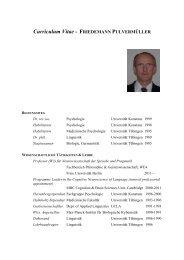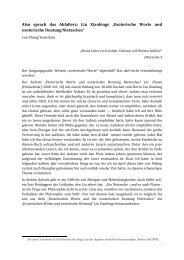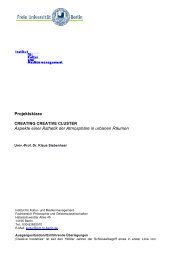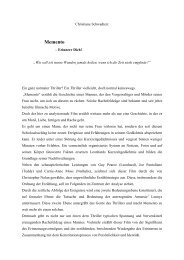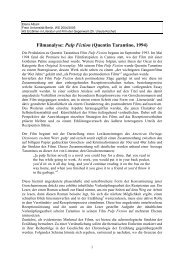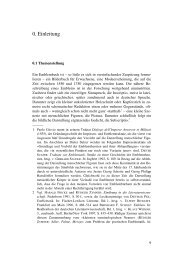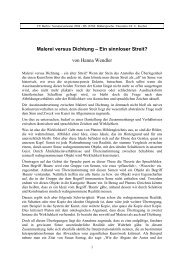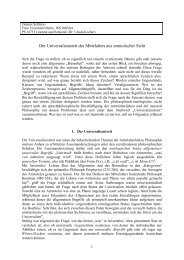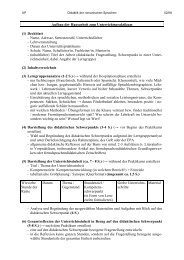nominalizations of french psychological verbs - Fachbereich ...
nominalizations of french psychological verbs - Fachbereich ...
nominalizations of french psychological verbs - Fachbereich ...
You also want an ePaper? Increase the reach of your titles
YUMPU automatically turns print PDFs into web optimized ePapers that Google loves.
246<br />
JUDITH MEINSCHAEFFER<br />
derive the syntactic realization <strong>of</strong> the semantic participants for the derived<br />
<strong>nominalizations</strong> from the representations in (19).<br />
6. Participant-realization rules for <strong>psychological</strong> <strong>nominalizations</strong><br />
Section 3 above described which types <strong>of</strong> prepositional phrases (de-phrase,<br />
pour-phrase, par-phrase) occur with which class <strong>of</strong> <strong>psychological</strong><br />
<strong>nominalizations</strong> (derived from ES-<strong>verbs</strong> and two types <strong>of</strong> EO-<strong>verbs</strong>), and to<br />
which semantic participants (experiencing entity, target or cause <strong>of</strong> the<br />
experience) these can refer. The present section aims at formulating three<br />
participant-realization rules by means <strong>of</strong> which the descriptive generalizations<br />
stated in section 3 can be derived from the semantic representations given in<br />
section 5. In particular, we want to derive the differing behavior <strong>of</strong> EO-<strong>verbs</strong> <strong>of</strong><br />
the fasciner-type and <strong>of</strong> EO-<strong>verbs</strong> <strong>of</strong> the décevoir-type with regard to which<br />
semantic participant can be realized in a de-phrase. For convenience, the<br />
semantic representations <strong>of</strong> the <strong>verbs</strong> are repeated in (22).<br />
(22) a. ES regretter PSYCH_RELATION (x, y)<br />
b. EO fasciner CAUSE (ACT (y), PSYCH_RELATION (x, y))<br />
c. EO décevoir CAUSE (ACT (y), CHANGE (PSYCH_STATE (x)))<br />
As to the de-phrase, regret-<strong>nominalizations</strong>, as well as fascination<strong>nominalizations</strong>,<br />
can realize both participants; experiencing entity and target <strong>of</strong><br />
the experience. Déception-<strong>nominalizations</strong>, in contrast, can realize only the<br />
experiencing entity, i.e., the participant over which the resulting <strong>psychological</strong><br />
state is predicated.<br />
According to the semantic representations proposed here, the semantic<br />
forms <strong>of</strong> fasciner-<strong>verbs</strong> and décevoir-<strong>verbs</strong> have identical first elements; the<br />
structure <strong>of</strong> the first element should therefore play no role. Furthermore,<br />
regretter-<strong>verbs</strong> and fasciner-<strong>verbs</strong> (which behave alike) have identical second<br />
elements, while fasciner-<strong>verbs</strong> and décevoir-<strong>verbs</strong> (which show the contrast)<br />
differ with regard to the second element <strong>of</strong> the predication. Hence, the relevant<br />
difference should reside in the second element <strong>of</strong> the complex predications. More<br />
precisely, for fasciner-<strong>verbs</strong> (as well as for regretter-<strong>verbs</strong>), the second element<br />
contains two arguments, while for décevoir-<strong>verbs</strong>, the second element contains<br />
but a single argument. In other words, for <strong>verbs</strong> <strong>of</strong> the fasciner-type, the state<br />
which is caused is transitive, i.e., it is a <strong>psychological</strong> relation, while for <strong>verbs</strong> <strong>of</strong><br />
the décevoir-type, it is intransitive, i.e., it is a <strong>psychological</strong> state. The<br />
generalization which can be drawn is then that the semantic participants which<br />
can be realized by the de-phrase are those which appear in the second, or





